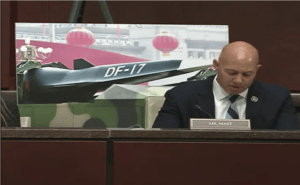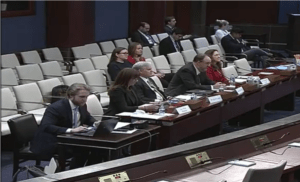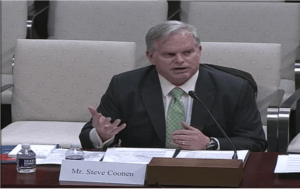Are export restrictions for China working?
Based on the assessment of the key leaders of the House Foreign Affairs Committee’s Subcommittee on Oversight and Accountability, the answer is “not really”.
In a two-part subcommittee hearing on export controls, which kicked off last Thursday, Chairman Brian Mast (R-FL) kicked the day off with a laundry list of items painting China as an aggressor nation in the South China Sea, “gearing up for a fight”. Behind him were Chinese hypersonic weapons like the DF-17 glider missile. Warnings from Washington are that China is ahead of the U.S. on hypersonic traveling missiles. He ran through two Washington Post articles from 2021 and 2022 on how U.S. computer hardware was being sold to China and used to make these advanced weapons systems. He said China isn’t looking for “strategic competition” – a phrase used by the White House to describe the  new position it finds itself in with China.
new position it finds itself in with China.
“During a six-month period between November 2020 and April 2021, the Bureau of Industry and Security approved $60 billion worth of licenses for American technology to Huawei and $40 billion worth of licenses to China’s Semiconductor Manufacturing International Corp.. It’s denied less than 1 percent of licenses to both companies,” he said, adding that more than 90% of technologies are sold to China without a license. “Of the 1% of exports that do need a license, only 2% of those licenses are denied.”
BIS is part of the Commerce Department. It controls the export restrictions list for Chinese companies like Huawei. American companies must get permission to sell computer hardware to Huawei, among others. But there are exceptions and not all products are banned. The existing list, plus rules, is more than 500 pages long.
“We have laws and regulations that fill binders upon binders upon binders,” Mast said in a heated opening to the day’s hearing. “But they’re wasted words if we don’t actually enforce them.”
The takeaway from the hearing was that export controls are failing. And questions abounded as to whether it was too late to fix the situation.
Following are some comments from the opening remarks of witnesses, and exchanges with Committee members in the Q&A session:
 Nazak Nikakhtar, Chair, National Security Practice, Wiley Rein, LLP
Nazak Nikakhtar, Chair, National Security Practice, Wiley Rein, LLP
(Former Assistant Secretary for Industry and Analysis, International Trade Administration, U.S. Department of Commerce):
“America let its technology offshore because we mistakenly believed that we needed the revenue from the Chinese market to innovate. But the money received pales, pales in comparison to the value of the technology we transferred to China, coupled with the subsidies that the Chinese government used to mature these innovations into powerhouse mammoth industries that span across China today and are crushing competitors globally. We lost, they won, and China is now leading the world in many of the important technologies. Make no mistake, in semiconductors, a very apt example, China has developed the equipment, wafer fabrication capabilities, the design technology, and the upstream supply chains to dominate the global sector. Its immense control over the critical upstream supply chains also gives its leverage to destroy the chip sector of all other competitors. Let me be clear, China no longer needs us. With our technology, it can make both legacy and advanced chips and leading-edge chips.”
Steve Coonen, former Senior Foreign Affairs Advisor, Defense Technology Security Administration:
“I felt like I was watching a car crash in slow motion every time the federal government approved a technology transfer that fed the buildup of an adversarial Chinese military and furthered their modernization efforts. Too few inside the system seemed willing to recognize this danger. I’ve submitted to you my written statement, which was also released yesterday by the China Tech Threat. My thesis is that willful blindness characterizes the various actors regulating technology sales to Chinese entities. Their refusal to stop China from legally capturing American technology undermines American national security. At the center of the export control system is Commerce.
In my view, BIS is failing to prioritize national security in its decision-making. BIS is grossly underestimating Xi Jinping’s military-civil fusion strategy, which is diverting dual-use technologies to the People’s Liberation Army. As evidenced in BIS’s report on U.S. trade with China that was just released this week, in 2022 BIS approved 91% of applications with the export of controlled militarily useful technology to China. From my vantage point, the main problem is that BIS takes a business-first view of applications. BIS will rubber stamp applications unless they have specific indications or intelligence of diversion.”

Witnesses prepare to answer questions in a House Foreign Affairs Subcommittee hearing on May 11, 2023.
* * *
Rep. Scott Perry (R-PA): We’re not really stopping any technology in a meaningful way from getting into the CCP. Now entities on the entity list are typically subject to a presumption of denial licensing policy. Do you think that BIS is faithfully implementing that when it approves 98% of license applications?
Nikakhtar: It’s pretty horrific that when you look at the entity list, you have out of the 400 — approximately 473 Chinese companies on the entity list, if you take into account the affiliates, 81% of them have licensing policies that have a case-by-case license review mechanism, which for all intents and purposes, minus a little bit of details, essentially removes them from the entity list. I mean, what are we doing? These guys are put on the entity list and then get treatment from somebody that’s not on the entity list. It’s absurd.
Perry: How do we improve this?
Nikakhtar: We should be designating many, many more companies. The fact that we have around 473 companies out of all of Chinese military industrial complex is absurd. We need to be designating more companies. Don’t fear litigation. Defend the actions of the right in the interest of national security. Also, we’re not adequately designating subsidiaries and affiliates. I’ve worked trade. I have the unique opportunity that to know everything in the trade laws, trade laws that have been upheld by the highest courts of the country and are WTO consistent, why are we not applying those laws, those regulations, that legal framework to determining affiliation? BIS is going to complain about the burden. We don’t need BIS to designate every single affiliate. BIS issues regulations that says affiliates are now on the entity list. Industry, do your own due diligence and if you cannot do your own due diligence, then don’t export because the risk is too high.
Rep. Michael Waltz (R-FL): Do you think the harmonization of those lists across US agencies could help with these issues and particularly with PRC diversion of technology?
 Coonen: I absolutely think that the harmonization of those lists would help.
Coonen: I absolutely think that the harmonization of those lists would help.
Waltz: I have legislation that I look forward to marking up through this subcommittee that would do just that and hopefully really gets our arms around this problem. We cannot spend and spend on science and technology nine hundred billion dollars a year, and then watch it literally walk right out the back door to China.
* * *
Ranking Member Jason Crow (D-CO) said earlier in the hearing that while imperfect, export controls were having an effect on China. He advocated for more rigorous control of existing export restrictions.
“The of the most important ways we can wield that power is through the smart and effective imposition of export controls,” he said. “Now export controls can be used to cut off access to American products, intellectual property, and technologies that bad actors would use to undermine U.S. security, violate human rights, and circumvent international law. This is one way in which the U.S. government can pull the economic levers at our disposal. And it is a tool the Biden administration has used repeatedly and robustly, and arguably more than any previous administration, and I would say to great effect. That’s not to say they’re perfect, but they are evolving.”













